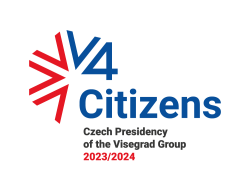
Summit of the V4 Prime Ministers
The prime ministers of the Visegrad Four countries met in Prague on June 22, 2012, on the occasion of the conclusion of the Czech V4 Presidency. One of the main outcomes of the summit was a joint letter from Prime Ministers Petr Nečas, Viktor Orbán, Donald Tusk and Robert Fico to the heads of the supreme EU institutions summing up their common key priorities as the June European Council approaches.
The letter, addressed to the presidents of the European Council, Hermann Van Rompuy, the European Commission, Jose Barroso, and the European Parliament, Martin Schulz, sets out the Visegrad Group’s position on the current situation in the euro area and the European Union. “The letter outlines the core priorities we share,” said Czech Prime Minister Petr Nečas. In their letter, the Prime Ministers of the Czech Republic, Hungary, Poland and Slovakia agree on the need for a national approach to structural reforms and fiscal consolidation. The aim is to find the best tools to support employment and growth while ensuring that the competitiveness of Member States is maintained in the longer term. In this light, they call for a discussion on the possibilities of restarting economic growth. “We believe that, through these considerations and suggestions, we can constructively contribute to the success of our joint efforts to identify new elements of growth,” write the Prime Ministers in their letter.
The V4 countries view fundamental structural reform at national level as one way of achieving these objectives. They also stress the completion of the single European market as a precondition for future growth in the EU, accelerated by reduced regulatory and administrative burdens. In the letter, they also single out the multiannual financial framework for 2014–2020 as an important vehicle. Cohesion policy should aim to close the gap between more and less developed regions and Member States.
Czech presidency praised by prime ministers
The summit was also an opportunity for V4 prime ministers to assess the ending Czech Presidency of the group and discuss the agenda of the upcoming Polish Presidency. The Czech Presidency focused on close cooperation on European issues. This coordination resulted, among others, in a common approach to cohesion policy matters in negotiations on the new EU budget for the years 2014 to 2020.
“We expressed our deep appreciation of the Czech Republic and its Prime Minister who paved the way for solid results and proved to be a great leader,” said the Hungarian Prime Minister. He stressed that, in addition to reforms, it was important to focus on renovation. He warned against further borrowing, which, he said, could be prevented by tackling future issues. “The Czech Presidency has been successful because it concentrated on issues awaiting us in the future,” said Viktor Orbán. “The one-year Czech presidency was pragmatic and to the point,” noted the Slovak Prime Minister, Robert Fico, in his review of the past year.
V4 cooperation works smoothly
All four Prime Ministers also agreed that cooperation within the Visegrad Group was very strong and that coordination of common procedures was smooth. “V4 has clearly proven itself a sound platform for the coordination of our positions in numerous areas,” said Czech Prime Minister Petr Nečas. “The resultant letter is proof that such cooperation is possible,” added the Polish Prime Minister Donald Tusk after the summit.
V4 plans to support its eastern neighbours
Another item on the agenda was the support of countries on the EU’s eastern border. “All our countries have launched the Visegrad 4 Eastern Partnership programme within the framework of the International Visegrad Fund,” said Prime Minister Petr Nečas, emphasizing the V4 countries’ interest in those eastern states and their future integration. This project will also contribute to the European Eastern Partnership policy.
Another of the key topics at today’s summit and throughout the Czech presidency was energy and the related common position of all four countries, which agree in particular in matters of energy security, the energy mix in the hands of each member country, and nuclear energy.
Download:
-
Joint Letter to the EC [.PDF, 471 KB]
- Joint Statement
Source: www.vlada.cz







